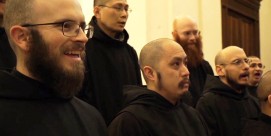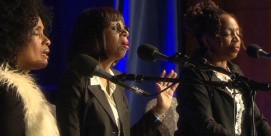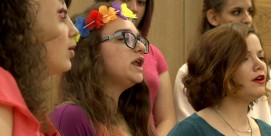In This Episode << SLIDE LEFT TO SEE ADDITIONAL SEGMENTS
Klezmer Music
BOB ABERNETHY, host: Klezmer, rooted in the Jewish religious tradition, has become very popular. Based on East European Jewish wedding and folk music, klezmer is being played in concert halls, trendy nightclubs, and on festival stages throughout the world. And it’s not just Jews who are listening. Music critic Seth Rogovoy reports about klezmer’s growing popularity. The first voice is Hankus Netsky of the Klezmer Conservatory Band.
HANKUS NETSKY (Klezmer Conservatory Band): The reason the music is so popular is that it has a beat that you just can’t ignore, and it literally makes people get up out of their seats and dance.
SETH ROGOVOY, correspondent: Klezmer, which means “vessel of song,” has evolved from the instrumental dance music played at Jewish weddings and celebrations. The melodies were often borrowed from traditional prayers and songs and influenced by East European ethnic music. Klezmer is played in a distinctive melodic mode that sounds happy and sad at the same time.
MR. NETSKY: You don’t just play, and play notes. You have to feel it. It’s definitely all about expressing your feelings and very often feelings of pain, feelings of longing, which are part of even the happiest piece.
ROGOVOY: Klezmer also has a spiritual dimension greatly influenced by Hasidism, a popular mystical movement born in 18th-century Eastern Europe.
MR. NETSKY: In Hasidic culture, music is so important. In fact, to write a beautiful melody is to in some way heal the entire universe. To play a song with the right intention is so important because that will give the song special power. The entire way that a composition is looked at in Hasidic music is about a spiritual awakening.
ROGOVOY: While today’s klezmer is sometimes combined with influences from jazz, rock, and world-beat music, it is still characterized by the sound of the wailing clarinets and violins. The musicians bend and twist notes to evoke the sound of the prayers chanted by a synagogue’s cantor, which produces the laughing and crying quality of klezmer.
DAVID KRAKAUER (Klezmer Madness): I think that’s what makes klezmer music so special, and the klezmer clarinet, because it is really the sound of the cantor, it’s the sound of the Yiddish language. When I first started to play klezmer, I had this instant recognition: Oh, that’s the voice of my grandmother.
ALICIA SVIGALS (The Klezmatics): The way the instruments play and imitate the cantor’s voice is so strongly Jewish that it feels like religious music even when it’s not.
ROGOVOY: By the 1950s, popular music replaced klezmer as American Jews assimilated into the mainstream. It wasn’t until the 1970s and ’80s that a new generation of younger musicians rediscovered the music of their grandparents.
MS. SVIGALS: I think that klezmer has made a comeback since the 1970s as part of a larger trend in the country generally of young people looking towards their roots for meaning, for self-definition. Klezmer became for a lot of young Jews, who were casting about for a way to be Jewish, a way to be Jewish that they felt really great about.
ROGOVOY: According to Hankus Netsky, klezmer is especially popular with non-Jewish audiences in the places where it originated and where Jewish culture was destroyed during the Holocaust.
MR. NETSKY: For many of the younger people in Germany, in Holland and Poland, the music represents something that they feel was taken away from them, that they were denied. They feel like they don’t have their blues.
ROGOVOY: And so these young musicians have picked up where their grandparents left off, reviving and revitalizing the old tradition of klezmer by bringing it back to Jews and also extending its reach beyond the Jewish audience.
For RELIGION & ETHICS NEWSWEEKLY, I am Seth Rogovoy.







